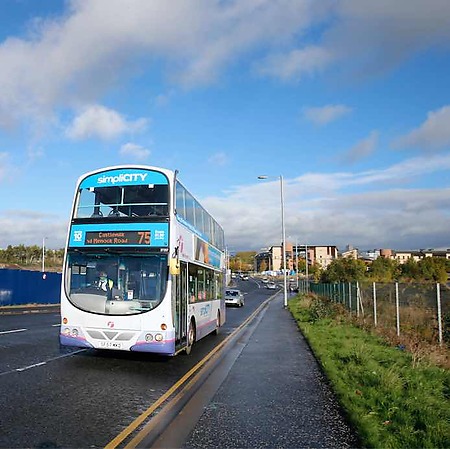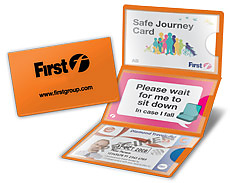Language & Communication2nd July 2015
Bus Drivers learn sign language to help deaf customers
First Glasgow responds to Deaf customer communication needs
 As a Deaf Awareness trainer and BSL teacher for 20 years, I have spent many a long hour working with leaders and managers in organisations trying to persuade them of the benefits of becoming more Deaf aware. It has been and continues to be, a hard sell, but there is definitely some movement in the air, especially around the deployment of remote interpretation.
As a Deaf Awareness trainer and BSL teacher for 20 years, I have spent many a long hour working with leaders and managers in organisations trying to persuade them of the benefits of becoming more Deaf aware. It has been and continues to be, a hard sell, but there is definitely some movement in the air, especially around the deployment of remote interpretation.
Through engagement with the empowered decision makers, I always strive to get a commitment to change and an energy behind any subsequent change process, but sadly, early positive signs frequently slip like water through my fingers. Treating Deaf people with respect, dignity and understanding is not high on the agenda for many it seems, with tokensism often the outcome.
However, I am pleased to see a little bit of momentum recently coming from people in the front line of businesses who actually experience deaf customers, although I feel there is still some way to go for their organisations to truely understand the issue of deafness and the ideal stance businesses should be taking.
In this particular example, I am referring to First Glasgow, which is the largest bus operator in the city, running services on more than 80 different routes. First Glasgow operates more than 900 buses and employs around 2,400 staff. It is part of an enormous company called the FirstGroup plc, which is the leading transport operator in the UK and North America with revenues of more than £6.7 billion a year. The company employs 117,000 people and transport around 2.5 billion passengers a year.
Last week, First Glasgow highlighted how they were, 'going the extra mile to help customers with hearing problems, with drivers being offered the opportunity to learn sign language so they can communicate better with customers who have hearing difficulties.'
 This initiative stems from two drivers based at their Scotstoun Depot, who made their bosses aware that some of their regular customers have 'impaired hearing'. Ian Graham, First Glagow's learning representative, responded by arranging for the drivers to have access to what was called specialist teaching resources - a step-by-step sign language CD containing a guide to basic techniques.
This initiative stems from two drivers based at their Scotstoun Depot, who made their bosses aware that some of their regular customers have 'impaired hearing'. Ian Graham, First Glagow's learning representative, responded by arranging for the drivers to have access to what was called specialist teaching resources - a step-by-step sign language CD containing a guide to basic techniques.
Commenting on the initiative, Ian Graham said, “We have made available teaching CDs which offer a step-by-step guide to learning sign language. I think the training is giving the drivers more confidence, which in turn helps them to deliver excellent customer service.”
Bus drivers who have used the CDs and learned some basic techniques have reported early success with one driver describing how he regularly uses three sentences that he has learned which are met by smiles by the passengers concerned.
Championing the initiative, Fiona Kerr, First Glasgow’s Managing Director, commented: “We want to make travelling by bus as easy as possible for all of our customers, including those who are deaf or hearing impaired. All First drivers receive customer service and disability awareness training which includes dealing with issues faced by deaf and hearing impaired passengers, and we have Safe Journey Cards available to customers who may find it a useful way of asking for any assistance they may need."
“These additional learning opportunities for drivers will help us deliver our excellent customer service to those with hearing impairments too.” First Glasgow depots also display posters which advertise ways that drivers can help customers with hearing impairments.
I am so pleased that the drivers involved in this bottom up problem solving are being given an opportunity to learn a few sentences, and their desire to meet the needs of their customers is worthy of great praise. I was also pleased to learn that the resources introduced to meet their communication needs, has also been made available to all of the Glasgow First bus drivers although taking the training at this stage is optional.
 Promotion of this initiative by Glasgow First demonstrates that the company recognises that there is more they can do to provide deaf customers a better user experience when travelling on their buses. Through engagement with Deaf and Hard of Hearing people, the company has the opportunity to truly understand customer needs and the steps they need to take to meet those demands.
Promotion of this initiative by Glasgow First demonstrates that the company recognises that there is more they can do to provide deaf customers a better user experience when travelling on their buses. Through engagement with Deaf and Hard of Hearing people, the company has the opportunity to truly understand customer needs and the steps they need to take to meet those demands.
Whilst the term hearing impaired is used widely in the media, one thing I would advocate quite quickly, is that the term hearing impaired is withdrawn from the company vocabulary, as many deaf people don't like it, or relate to it. The steps taken to date help the drivers to overcome the problem they have with the inability to communicate effectively with some of their customers, and further work in this area would undoubtedly bring further benefits.
The provision of DVDs with basic techniques is a good start, but it is just that, a start. FirstGroup plc is one of those companies that have the opportunity and the resources needed to set new standards of deaf friendly customer service in the industry.
It is lovely to know that through the action of their bus drivers these few Deaf customers in Glasgow have a driver who knows some sign language, and we hope that through their example, other drivers will follow suit.
Introduced for all customers, First Glasgow is also rolling out free wifi to customers travelling on their buses with 60% of buses already offering this service. With deaf people now being amongst the most frequent users of text and video messaging as well as users of social media the wifi will help their Deaf customers to stay in touch and not feel so isolated whilst making a journey.
 First Glasgow's top tips for travelling by bus when you are Deaf or Hard of Hearing are:
First Glasgow's top tips for travelling by bus when you are Deaf or Hard of Hearing are:
- If you need to buy a ticket from the driver and have difficulty speaking, it can be useful to write down what ticket you need and show the note to the driver.
- Download a Safe Journey Card from www.firstglasgow.com. The Safe Journey Card has been designed to make it easy for you to tell the driver that you need some extra help to make your journey on the bus. For example, that you’d like the driver to speak louder because your hearing is impaired, or that you need more time to reach your seat.
- First Glasgow bus services operate an ‘exact fare only’ system so it’s useful to have the correct fare for your journey before you board the bus.
- Know the approximate journey time to your destination by planning your journey beforehand using First Glasgow’s ‘Journey Planner’ or looking up the timetable at www.firstglasgow.com
- If you’re unsure of where the bus stop is for your destination request that the driver lets you know when the bus has arrived.
- First Glasgow buses are fitted with illuminated bus stopping signs near the front of the bus that light up when a passenger pushes the stop button.
Article by Sarah Lawrence
posted in Community / Language & Communication
2nd July 2015





